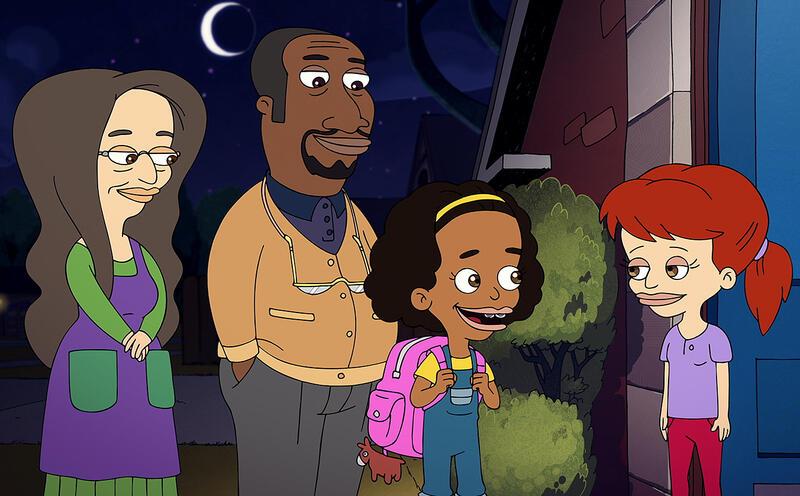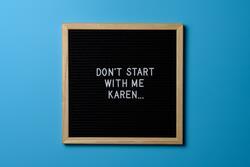Loving Cartoons as a Black Woman: Thoughts on Jenny Slate Leaving 'Big Mouth'
The first time Jenny Slate made me laugh was during her appearance in the Coca-Cola episode of Comedy Central’s Drunk History. As Slate voiced the live-action segment, the transitional scenes cut to her interview with the host. A tipsy and bedimpled Slate giggled as her dog Reggie barked in the background. The effect was incredibly charming. Her humor is a comedy that captivates: fresh, slightly biting, but always refreshingly good-natured. Whatever the “it” factor is, Slate has it, bringing zest to her role as spoiled rich girl Mona Lisa Saperstein in Parks and Recreation, the princess of mean Tammy Larsen in Bob’s Burgers, and more recently, as Missy in Netflix’s raunchy animated series about puberty, Big Mouth.
But we'll get back to Slate and Big Mouth in a moment.
I love cartoons. Loving cartoons as a Black woman means understanding I'll rarely see (or hear) myself on screen, which is unfortunate, as I've been a cartoon junkie since watching The Flintstones in syndication every day after school. My addiction fed on The Jetsons, Josie and The Pussycats, Jem, King of the Hill, and Baby Blues. I know William Fontaine de la Tour Dauterive's home state (Louisiana), I remember what television show featured The Simpsons in mini-vignettes throughout the show (The Tracey Ullman Show), and I can tell you Jem's alter ego's name (Jerrica). Pepper Ann? Don't even get me started on my love for Disney's Pepper Ann. She's like, one in a million.
I binge watch F is For Family and count the minutes until the next Rick and Morty episode, Every character on Bob's Burgers is my favorite. But if you asked me which cartoons feature Black voice actors, I'd have to pause to think. After five minutes of drumming my thumbs on my desk, a name appears: The Boondocks, which ended its original run in 2014 and featured the vocal talents of Regina King and the late John Witherspoon.
Few cartoons feature Black women as actors in supporting roles, let alone starring roles. Supporting characters of color pop up, often as part of B or C storylines, but rare is the animated show both starring characters of color and voiced by actors of color.
It's 2020, and diversity still hasn't reached cartoons, which brings us to the Apu problem. This controversy started when Indian Americans started vocally rejecting the stereotypical depiction of The Simpsons' convenience store-owning Apu Nahasapeemapetilon. That the person portraying Apu was white actor Hank Azaria made the depiction even more painful.
In 2017, comedian Hari Kondabolu produced a now-famous documentary, The Problem With Apu. The film explored the character’s cultural effect on Indian Americans, many of whom assert such a stereotypical portrayal gave racists fodder to use against their community. For those curious, yes, Azaria has seen the documentary. “The idea that anybody, young or old, past or present, was bullied or teased or worse based on the character of Apu on The Simpsons, the voice or any other tropes of the character is distressing,” he told The Los Angeles Times. “And especially in post-9/11 America, the idea that anybody was marginalized based on it or had a hard time was very upsetting to me personally and professionally.”
In January 2020, after much debate and defensiveness on the part of the production team, 20th Century Fox announced Azaria would no longer voice Apu.
A few months later, COVID-19 reached America, further highlighting the racial disparities in this country, particularly when it comes to labor and healthcare. Then, on May 25, George Floyd was killed by police. In the space of 8 minutes and 46 seconds, the American society at large realized something some of us had known for a long time: difficult conversations about race need to occur.
Which brings us back to Tammy Larsen and Slate’s masterful take on what could have been a one-note character.
Slate voices Bob's Burgers fan-favorite Tammy Larsen, a character known for being self-absorbed—the ultimate mean girl. The actor’s crackling delivery and marmalade voice match Tammy’s persona perfectly—the comedian fully inhabits every role she portrays. Like Slate, Tammy Larsen is also Jewish, an integral part of her character most notably displayed in the episode “Mazel Tina.”
The overbearing Tammy is so terrible at her bat mitzvah that the guests prefer the selfless charm and personality of another character instead. The episode could quickly devolve into broad strokes and easy laughs at the expense of a character who’s easy to hate-watch; instead, Slate's delivery draws the viewer in close to see the vulnerability of a preteen girl.
If anyone in Hollywood has lasting star power, it’s Slate. When Slate recently announced she stepped down from voicing the character of Missy, a young biracial girl on Netflix's Big Mouth, I appreciated the selflessness of the move. Her status as a comedian is still rising—bowing out costs her, financially, and in terms of exposure.
"At the start of the show, I reasoned with myself that it was permissible for me to play Missy because her mom is Jewish and white—as am I," writes Slate in an Instagram post from June.
That Slate identifies with Missy’s Jewishness makes sense, but she inadvertently ignored the Blackness of her character, a practice that erases people of color. "Missy is also Black," Slate writes "And Black characters on an animated show should be played by Black people."
Slate elaborates: By playing a Black preteen girl as a white woman (no matter how well-meaning), she "was engaging in an act of erasure of Black people" when she pushed aside the character's Black heritage when she took the role. The role, now the center of headlines, will now go to a woman of color, and serve to elevate both the role and the actor.
The cartoon is currently in its third season, and Netflix has already recorded the show's fourth season with Slate. The completed episodes will air as planned, after which the role will be recast.
"I acknowledge how my original reasoning was flawed," writes Slate, "that it existed as an example of white privilege and unjust allowances made within a system of societal white supremacy.
"Ending the portrayal of Missy is one step in a life-long process of uncovering the racism in my actions," Slate says in her post. "I can’t change the past but I can take accountability for my choices. I will continue to engage in meaningful anti-racist action, to be thoughtful about the messages in my work, to be curious and open to feedback, and to do my best to take responsibility for the ways that I am a part of the problem."
With Slate stepping aside to address the problem, she becomes part of the solution for the next generation of little Black girls.
One of my favorite lines of Slate's Tammy is when she demands her due. "I want a reward for being brave," the character says. "Like a frozen yogurt or a Prius."
Slate's funny, she's smart, and she’s on the right side of history (even if that side is a little drunk). I can't wait to see myself on screen… and something tells me Slate can't wait, either.







